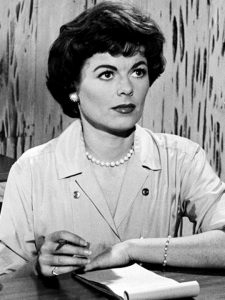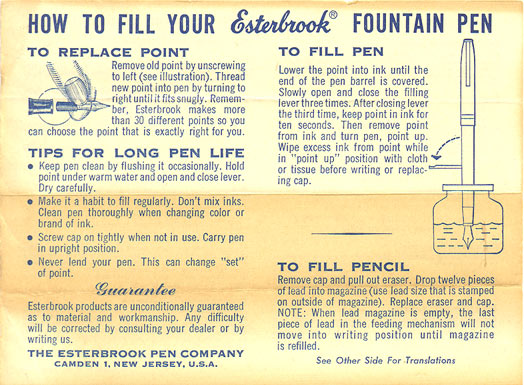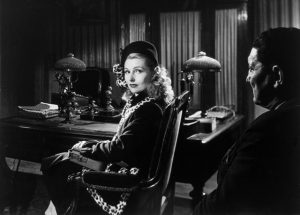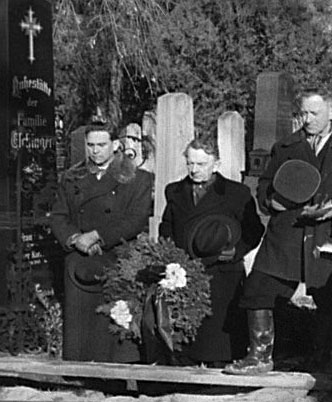
It’s funny how much flies right over your head when you’re young and ignorant. For example, when I first read A Streetcar Named Desire, I totally missed the fact that Stanley rapes Blanche; I thought their only problem was the way Blanche hogged the bathroom (listen, I was only twelve). Even more embarrassing, I’ve watched The Third Man literally dozens of times, but it was only the other night, at Noir City 2014‘s Castro screening that I realized two of the supporting players form a gay couple.
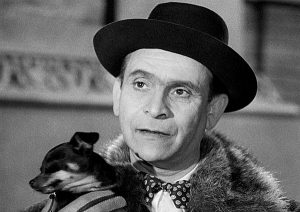
How could I have missed them? Baron Kurtz (Ernst Deutsch) with his little dog and heavy eyeliner, and Dr. Winkle (“Doctor Vinkle” he corrects the hero unsmilingly) played by Erich Ponto. Winkle’s the straight-acting half of this menage, who gives himself away by his attempts to conceal his more flamboyant partner. “Isn’t that the Baron’s dog?” Holly Martins (Joseph Cotton) asks when he’s visits the doctor to question him about Harry Lime’s death. Winkle denies it, shooing the dog into another room and closing the door. Through a glass pane, light gleams, hinting at an unseen presence. “I have company,” he says, anxious to get rid of the importunate Holly.
Is he wearing a bathrobe in that scene? I don’t remember, but both men make their final appearance in morning-after deshabille, standing next to each other on their wintry balcony while Holly shouts to them from the street. Kurtz is carrying his little dog, and their elegant dressing gowns and carefully knotted foulards are the 1948 equivalent of being caught in flagrante delicto. “Come up!” invites Kurtz, but Holly declines. “I like it out in the open.” What, precisely, is the danger? Is it their involvement in Vienna’s black market penicillin racket, or the more ancient air of corruption and decadence they exude? It hardly matters that the sinister ambiance that hangs over them like a fog resolves itself into an identifiable crime. Gays are criminals and criminals are gay.
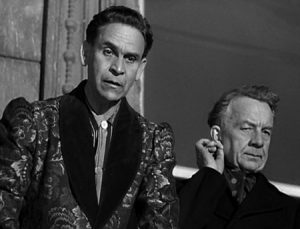 In fact, they join a lineup of gay criminals who crowd the margins of the screen in film noir, crime thrillers, and B-movies, a procession of doubly guilty characters who culminate in the over-the-top offensiveness of Mr. Kidd and Mr. Wint, homo assassins in the 1971 James Bond flick Diamonds Are Forever.
In fact, they join a lineup of gay criminals who crowd the margins of the screen in film noir, crime thrillers, and B-movies, a procession of doubly guilty characters who culminate in the over-the-top offensiveness of Mr. Kidd and Mr. Wint, homo assassins in the 1971 James Bond flick Diamonds Are Forever.
All those viewings and I never saw them. Probably my unwordliness when I first watched the film (most likely on television in my early teens) persisted like an after-image, blinkering me until last Friday at the Castro. Until then the two men operated on me as I suppose director Carol Reed and author Graham Greene intended — easy cinematic shorthand for evil, a way to offer a whiff of unheimlichkeit without waking up the censor.
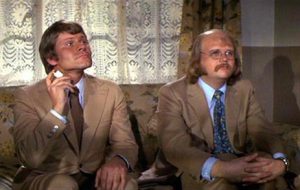
Mr. Wint (Bruce Glover) sprays himself with perfume while his partner in murder-for-hire and life, Mr. Kidd (Putter Smith) sits by.


